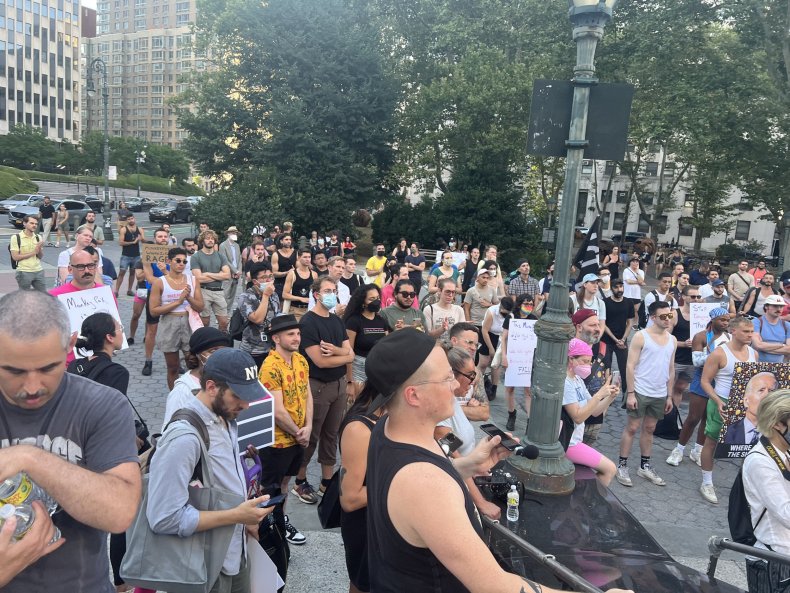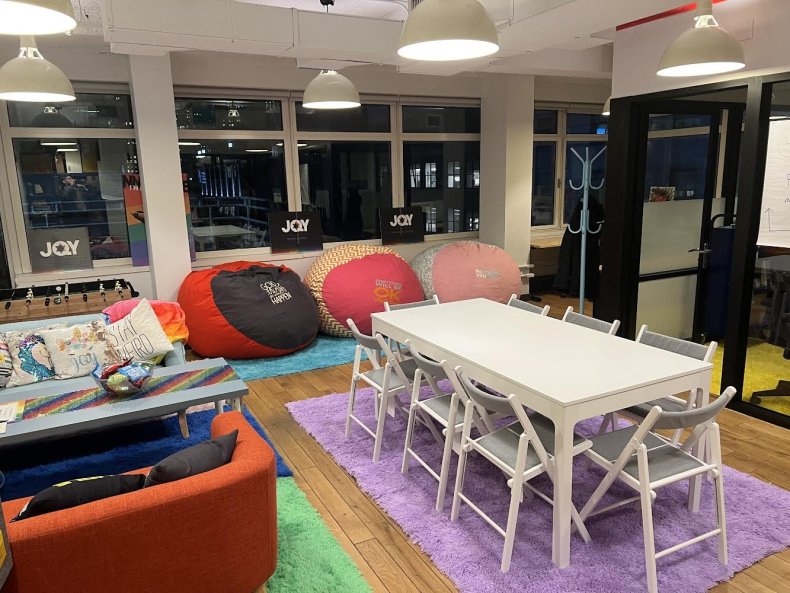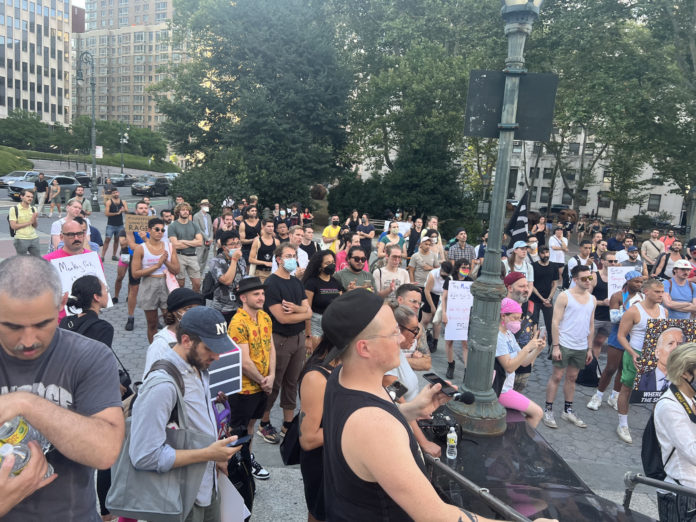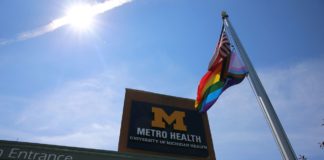Standing in Foley Square, Manhattan, on Thursday, July 21, ahead of our first big protest against the treatment of the LGBTQ community around monkeypox, I thought to myself, “We need to keep fighting for change in our healthcare system.”
Monkeypox is a brisk and awful virus causing blisters to form around the genital areas, including the face, and even in the eyes. Although this particular disease is spread among men who have sex with men, it is also transmitted through skin-to-skin contact.
Prior to knowing this information, I had traveled to Fire Island, a gathering of the gay community in Long Island at the beginning of June, where my friends and I rented a house for the weekend.
Days later, I heard that several of my friends were developing an illness, which we now know to be monkeypox. After asking friends of friends if they had caught the virus too, we realized that over twenty people in our friendship circles had monkeypox. Of course, that evening, I visited the CDC website for further information. It stated that in New York alone, only 23 people had tested positive for monkeypox in June. Something did not seem to add up—from the very beginning, it felt like this virus was downplayed or underreported.

MORDECHAI LEVOVITZ
The LGBTQ community is typically vigilant about our health. Many of us are aware, from the AIDS crisis in the eighties, the lack of consideration towards one’s health can take out a population.
To further investigate the matter, I had conducted some individual research and found that the U.S. had tens of thousands of doses of the vaccine approved for use against monkeypox, Jynneous. So, on Friday, June 21, I visited The Department of Health in Chelsea to express that I had been in close contact with my friends who had caught monkeypox, and desperately needed the vaccine. There is only a four day window from the time of exposure where the vaccine can prevent viral transmission.
I was shocked when the nurse informed me that she could not give me the vaccine because 1,000 doses had been available in New York in the first national distribution of the vaccine. After advising me to visit the emergency room, I was met with the same response by doctors. I was completely horrified, not only because I wasn’t able to receive a vaccine that appeared to be easily accessible, but because it dawned on me that Pride, the biggest national LGBTQ gathering was occurring a few days after this, on June 26.
With thousands of people in close contact with each other all weekend, I was certain that a health crisis was set to unravel before my very eyes.
Immediately, I called several news outlets and explained that a possible epidemic was about to occur and that it would be detrimental to the LGBTQ community if the people who are in power do not speak about it. I was quickly turned away by two major news outlets, until I called NY1 local news. That evening, they agreed to interview me.
I’d rightly assumed, after Pride, that monkeypox cases would skyrocket to thousands. Yet vaccines were not being distributed. Sadly, many news outlets were still refusing to cover the outbreak in detail, so I took to Facebook to organize a march in Foley Square, in mid-July, demanding more testing, more vaccines, and easier access to the treatment that seemed to be denied.
A sense of excitement began to brew, and spread to other organizations like—ACT UP NY, PrEP4ALL, VOCAL-NY, Housing Works, and Callen-Lorde, along with other queer leaders and activists volunteering to join. In order to cooperate with these organizations, Consequently, we pushed back the protest date to Thursday, July 21, in Foley Square, New York, at 6pm.
Over 200 brave activists took to the streets, demanding more rights for their health. It was an evening filled queer rage, moving performances, inspirational speeches from activists, and most importantly, a strong sense of unity that ignited a fire within us. We focused on the negligence surrounding our healthcare system and the apparent intransigence that was occurring, when it came to making these vaccines available. We telling those in power that be that they can not mess with our health—that they cannot wave the rainbow flag and say that they are our friend if they are not willing to keep us healthy and safe.
The protest gained significant media attention and raised awareness of the fact that over a million doses were ready to be shipped in April, from Denmark, but were held in a freezer at the time as they were not FDA approved at the time. But what makes this more shocking is that the 300,000 doses in Denmark that were FDA approved and ready to be shipped, were still held in that same freezer for weeks, not considering the priority in our healthcare system.
This was naturally confusing for the LGBTQ community, as a flight from Denmark to America is only ten hours long – that one flight could save many lives.
I thought to myself, is there no urgency surrounding this because it predominantly affects gay people?
There is already a narrative out there that monkeypox, which disproportionately affects the LGBTQ community, is something to be ashamed of, as this virus is not discrete; it causes blistering on the face.
Of course, this brings back the same trauma that those before us experienced with AIDS, as many of the symptoms, too, could not be hidden. We went through this in the eighties, when our community pressured the FDA to remove the red tape from treatments for AIDS patients suffering from rare infections—I couldn’t believe that almost forty years later, things hadn’t quite changed.
I am very sensitive to a system that is resistant. I grew up in a very Orthodox Jewish family in Boston, Massachusetts, and moved to Long Island when I was 11. I started learning “Mishnah” and “Talmud,” the first major written collection of the Jewish oral traditions, as early as eight. Naturally, this urged me to be precocious and think about philosophical and theological matters.
Despite being an outcast, I was empowered from a very early age to take on big ideas and question the things around me. As much as I experienced a childhood that was strict and closed, it was also a childhood where questions were not shunned.
This allowed me to form Jewish Queer Youth in 2001—an empowering organization that first began communicating in an email chain, consisting of fifteen queer youth under the ages of 22.
At the time, we did not want to accept that we had to live closeted, shameful lives. We were leaders. We refused the narrative that we were somehow victims—the “poor gays” in the Orthodox Jewish world—we were medical school students and young Ph.D. students, who were at the top of their classes. We were truly amazing.
Since 2001, we’ve accomplished many things that have been a pinnacle force of change for the Jewish LGBTQ community. In 2012, members of JQY sued an organization called JONAH which was openly offering conversion therapy that had traumatized many of our youth at the time. In 2015, we won. It was one of the first ever cases where queer people sued a conversion therapy charity and managed to shut them down.

MORDECHAI LEVOVITZ
In that same year, JQY opened up a program for queer Orthodox and Hasidic students which later expanded to several youth hubs in New York, and in December 2021, we were granted a million-dollar donation to bring this same drop-in center to Chicago, South Florida, Baltimore, and New Jersey.
I formed JQY for all of the youth who are too fabulous to think of their lives as anything less, it is a space for them to meet people like themselves; a space where we, as the older, queer generation, empower them. At JQY, they never have to apologize for being themselves—here, they are celebrated.
Though the healthcare system may still be failing us in some aspects, the LGBTQ community has grown immensely over the past forty years.
We are consciously choosing to abandon the narrative of shame that comes with being queer—whether that be related to monkeypox or one of our own being victimized, we will always take to the streets.
That is why phrases like “It has always been that way” need to change.
Mordechai Levovitz is the clinical director and co-founder of Jewish Queer Youth, a non-profit organization that supports and empowers queer youth from Orthodox, Hasidic, Sephardi, and Mizrachi Jewish homes. He is also an activist and public speaker.
All views expressed in this article are the author’s own.
As told to Carine Harb.
Updated 10:05am ET, 7/27/22: The article headline was changed for clarity.








